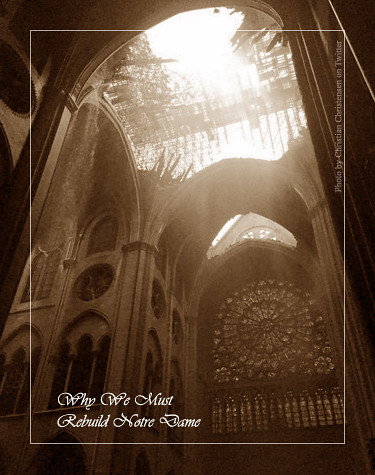
Volume XVI, Issue XVI
Why We Must Rebuild Notre Dame
As fire roared through the 800 year old “Forest,” the oak timbered roof structure of Notre Dame de Paris, many of us were moved to tears. Firefighters fought valiantly but regretfully admitted that they of themselves could not save the venerable cathedral. Helplessly we watched. Helplessly they fought on. Morning revealed that the ancient oak timbers and the lead roof were gone. The spire had collapsed into the intersection of nave and narthex, leaving a gaping hole in the limestone vaulting. Several more holes had been made in the vault by collapsing timbers. It was indeed a sad sight.
The morning also revealed that the great rose windows had survived with minimal damage. The great pipe organ survived, as did the Pieta and Cross at the Altar! We rejoiced. What had we lost? What had miraculously been saved? It was a flood of emotions. What does Notre Dame mean to us?
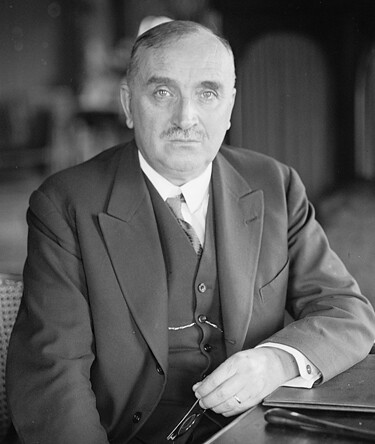
Paul Claudel.
French President Emmanuel Macron vowed to rebuild the Cathedral in an ambitious five years. Secular and Spiritual voices unite in the call to rebuild. So, what exactly is the importance of this Cathedral to the human story? Well, historians will point out that it represents a time when Western Culture, guided by Faith, created order out of the chaos following the demise of the great Roman State. The architecture, aspiring toward the transcendent, lifts the spirit! But then there are the personal recollections. In the transept of the great cathedral, just to the right of the nave near the Southern rose window is a plaque commemorating the conversion of French poet, playwright and diplomat Paul Claudel. Claudel’s life spans 1868 to 1955 and his early years were like that of so many young people today. He was a nonbeliever. He was not particularly motivated by spiritual things.
On Christmas Day in 1886, at the age of eighteen, young Paul attended the High Mass at the cathedral. He recalls that he was not particularly moved as the new archbishop celebrated the liturgy. But something prompted Claudel to return to the cathedral for evening vespers. “It was the gloomiest Winter day, and the darkest rainy afternoon over Paris.” As the Magnificat was sung, something happened in the young man’s heart: “In an instant, my heart was touched and I believed with such a strength of adherence, with such an uplifting of my entire being, with such powerful conviction, with such a certainty leaving no room for any kind of doubt, that since then all the books, all thee arguments, all the incidents and accidents of a busy life have been unable to shake my faith, nor indeed to affect it in any way.”
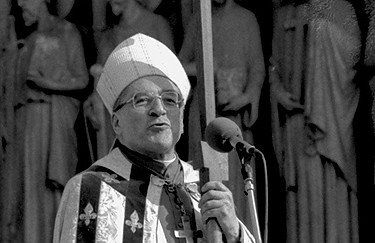
Jean-Marie Lustiger.
Then there is the story of Cardinal Jean-Marie Lustiger. He was born in Paris in 1926. His Polish Jewish parents were merchants who owned a store on the West Bank. During the Shoah, in which his mother died, young Jean Marie was taken in by a Christian family. He discovered a Bible in the home of his piano teacher – reading the familiar Torah, but going further into the New Testament story as well. At age 14, he visited the Cathedral in Orléans on Holy Thursday. Moved by the rich symbolism of the liturgy and the great cathedral, he returned on Good Friday and announced his intent to join the church. He would later study for the priesthood and eventually become Bishop of Paris, officiating over evening Mass in the great cathedral of Notre Dame! As a young seminarian, Bishop Robert Barron of Los Angeles studied in Paris and would often attend the Mass that Cardinal Lustiger officiated at. Lustiger would deliver energetic homilies – twenty minutes was a short one. Barron would often stand at the spot where Paul Claudel was converted, looking up at the North Transept Rose Window, which many consider to be the most beautiful of all the rose windows.
Robert Barron speaks of the powerful testimony of such a beautiful work – formed by now unknown craftsmen in worship to the Divine – that performed in him an “Alchemy of the Soul.”
We don’t build buildings like that today. Many of us worship in metal buildings driven by an economy prescribed by “good stewardship.” Some will argue that we should forgo rebuilding great cathedrals because the money can be better used elsewhere. To them I would simply say that this is not an either/or proposition. We should do both. Even the barest metal building church invests in “Worship” but it is usually just instruments for the worship band. All of us in some sense can identify with that moment in Matthew 26:7 when a woman anointed Jesus’ feet with precious perfume. There is beauty that springs from the proclamation of the Gospel. Notre Dame de Paris is indeed such a beauty. The testimonies of Barron, Lustiger and Claudel bear witness to it.
Faith and Beauty
Images that Lead to Worship and Relationship with God
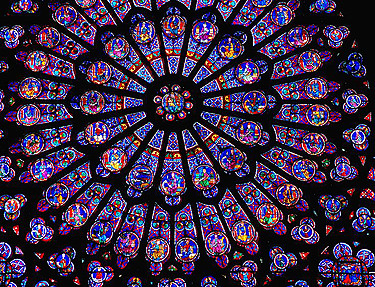
North Rose Window, Notre Dame de Paris.
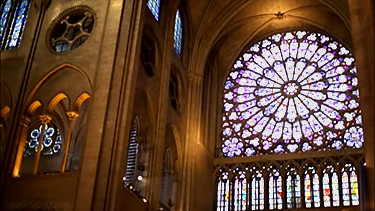
North Rose Window, Notre Dame de Paris.
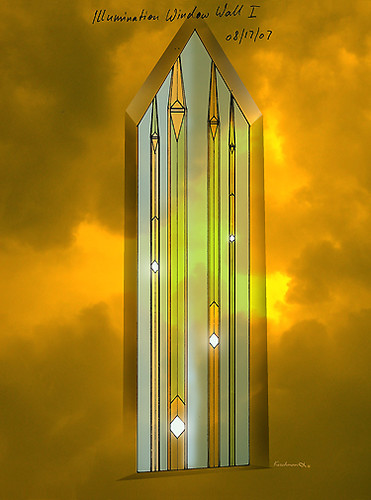
Sound Sculpture, Xaver Wilhelmy's design for functional glass organ pipes in a window combines beautiful visual imagery with beautiful music. Rendering by Bob Kirchman.
Catholicism and Beauty
By Bishop Robert Barron
A refreshing perspective on the place of the beautiful in leading to Faith.
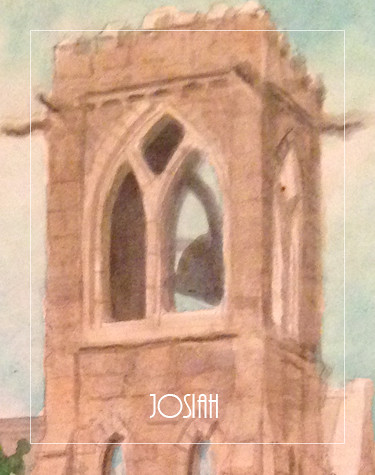
Volume XVI, Issue XVIa
Josiah
By Bob Kirchman
Copyright © 2019, The Kirchman Studio, all rights reserved
Chapter 2: Unto All Nations
On the campus on Big Diomede, young Josiah Zimmerman, Rupert’s grandson, walked with Jonathan Greene, the president of the college and Josiah’s favorite professor. They were discussing Matthew 24:14: “And this gospel of the kingdom shall be preached in all the world for a witness unto all nations; and then shall the end come.”
What constitutes a nation in the eyes of the Divine?” Josiah asked.
The dictionary says, ‘a large aggregate of people united by common descent, history, culture, or language, inhabiting a particular country or territory.’ Not too helpful in determining the mind of the Master. The rebirth of freedom in the North has come with a rebirth of fervor to reach the nations, as is evidenced by your presence at this institution. Still, I think we can identify such groups around us with some certainty and we are putting the Bible in their hands. The upcoming World’s Fair in Fairgate, Alaska will no doubt mark a point where we’ve pretty much put the Holy Scriptures in every human language there is. We correspond with believers in every part of the world. I think at this point the burden is on us to identify any particular place of occupation that has NOT been reached. That is where I think our Master’s focus would be.”
That is my frustration, sir. I feel like the work is going to be done before I get there. I read about the Moravians going out into the wilds and reaching the Cherokee and the joy of shining the Gospel where it has never shone before… and I look at the situation today. Even the Middle East is opening up to the message. With the demise of APOLLONIUS, the academy and the media have found new faith quite without our help. They started looking for truth and beauty again. Guess where it led them?”
Is it wrong, Dr. Greene, to be jealous to do a great work for God?”
That is a good one, young friend, and it deserves a thoughtful answer.” The good doctor was silent for a moment, then he continued, “Remember our discussion last week, and how for an artist like Sandro Botticelli the recognition of beauty led to transcendent truth. When he painted ‘The Birth of Venus’ it is evident that his sense of desire has been guided Heavenward. So it shall be with your ambitions to do great works. Think of Ransom in the college maintenance shops. He likes to work with his hands. Building a door gives him great pleasure… but I pray one day he will see who he’s building the door for! He’s an old special forces guy… mind and conscience pretty much seared, but get a planer in his hands and his eyes light up. God does not despise us for our aspirations. He meets us there. But, mind you, He will lead us upward. He has no desire to leave us playing in the mud when he’s planned for us a holiday at the beach! (I’m paraphrasing Lewis here).”
But, why should I feel such a passion to reach the nations if they have already been reached? I mean, should I not be able to find contentment and purpose in a simple task like Brother Lawrence who served most nobly working in the kitchen? Still, if I deny the drive inside me, I feel that I am lying.”
Passion is good, but true knowledge must define it. Remember the 2033 eclipse over Alaska. There was an author who wrote a book about the eclipse signaling the end of the world… nothing new here. The Millerites did it in the 19th Century. They were still waiting after their ‘appointed’ date and refigured it. Then they were still waiting after that. I think the Divine holds his cards close for a reason. We need to serve him like this will be our last day on Earth, but we need to build our works to last for 100 years. Some see contradiction there but it is clear that the tension between the two holds us in place to serve Him. I’m rambling, but I feel like the Lord will inform your passion and make it most profitable. You will indeed hear Him say ‘Well done, good and faithful servant!’ one day. That is enough.”
(to be continued)
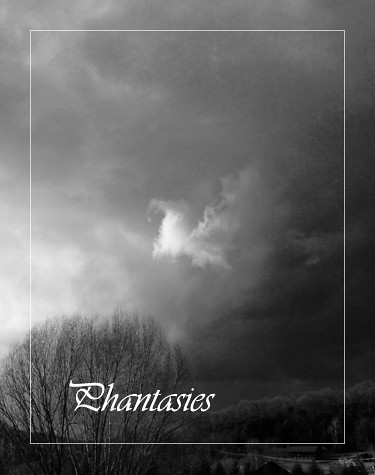
Volume XIII, Issue III
Phantasies
By George Macdonald, Chapter 25
Our life is no dream; but it ought to become one, and perhaps will."
~ Novalis
And on the ground, which is my modres gate,
I knocke with my staf; erlich and late,
And say to hire, Leve mother, let me in."
~ Geoffrey Chaucer, "The Pardoneres Tale".
Sinking from such a state of ideal bliss, into the world of shadows which again closed around and infolded me, my first dread was, not unnaturally, that my own shadow had found me again, and that my torture had commenced anew. It was a sad revulsion of feeling. This, indeed, seemed to correspond to what we think death is, before we die. Yet I felt within me a power of calm endurance to which I had hitherto been a stranger. For, in truth, that I should be able if only to think such things as I had been thinking, was an unspeakable delight. An hour of such peace made the turmoil of a lifetime worth striving through.
I found myself lying in the open air, in the early morning, before sunrise. Over me rose the summer heaven, expectant of the sun. The clouds already saw him, coming from afar; and soon every dewdrop would rejoice in his individual presence within it.
I lay motionless for a few minutes; and then slowly rose and looked about me. I was on the summit of a little hill; a valley lay beneath, and a range of mountains closed up the view upon that side. But, to my horror, across the valley, and up the height of the opposing mountains, stretched, from my very feet, a hugely expanding shade. There it lay, long and large, dark and mighty. I turned away with a sick despair; when lo! I beheld the sun just lifting his head above the eastern hill, and the shadow that fell from me, lay only where his beams fell not. I danced for joy. It was only the natural shadow, that goes with every man who walks in the sun. As he arose, higher and higher, the shadow-head sank down the side of the opposite hill, and crept in across the valley towards my feet.
Now that I was so joyously delivered from this fear, I saw and recognised the country around me. In the valley below, lay my own castle, and the haunts of my childhood were all about me hastened home. My sisters received me with unspeakable joy; but I suppose they observed some change in me, for a kind of respect, with a slight touch of awe in it, mingled with their joy, and made me ashamed. They had been in great distress about me. On the morning of my disappearance, they had found the floor of my room flooded; and, all that day, a wondrous and nearly impervious mist had hung about the castle and grounds. I had been gone, they told me, twenty-one days. To me it seemed twenty-one years. Nor could I yet feel quite secure in my new experiences. When, at night, I lay down once more in my own bed, I did not feel at all sure that when I awoke, I should not find myself in some mysterious region of Fairy Land. My dreams were incessant and perturbed; but when I did awake, I saw clearly that I was in my own home.
My mind soon grew calm; and I began the duties of my new position, somewhat instructed, I hoped, by the adventures that had befallen me in Fairy Land. Could I translate the experience of my travels there, into common life? This was the question. Or must I live it all over again, and learn it all over again, in the other forms that belong to the world of men, whose experience yet runs parallel to that of Fairy Land? These questions I cannot answer yet. But I fear.
Even yet, I find myself looking round sometimes with anxiety, to see whether my shadow falls right away from the sun or no. I have never yet discovered any inclination to either side. And if I am not unfrequently sad, I yet cast no more of a shade on the earth, than most men who have lived in it as long as I. I have a strange feeling sometimes, that I am a ghost, sent into the world to minister to my fellow men, or, rather, to repair the wrongs I have already done.
May the world be brighter for me, at least in those portions of it, where my darkness falls not.
Thus I, who set out to find my Ideal, came back rejoicing that I had lost my Shadow.
When the thought of the blessedness I experienced, after my death in Fairy Land, is too high for me to lay hold upon it and hope in it, I often think of the wise woman in the cottage, and of her solemn assurance that she knew something too good to be told. When I am oppressed by any sorrow or real perplexity, I often feel as if I had only left her cottage for a time, and would soon return out of the vision, into it again. Sometimes, on such occasions, I find myself, unconsciously almost, looking about for the mystic mark of red, with the vague hope of entering her door, and being comforted by her wise tenderness. I then console myself by saying: "I have come through the door of Dismay; and the way back from the world into which that has led me, is through my tomb. Upon that the red sign lies, and I shall find it one day, and be glad."
I will end my story with the relation of an incident which befell me a few days ago. I had been with my reapers, and, when they ceased their work at noon, I had lain down under the shadow of a great, ancient beech-tree, that stood on the edge of the field. As I lay, with my eyes closed, I began to listen to the sound of the leaves overhead. At first, they made sweet inarticulate music alone; but, by-and-by, the sound seemed to begin to take shape, and to be gradually moulding itself into words; till, at last, I seemed able to distinguish these, half-dissolved in a little ocean of circumfluent tones: "A great good is coming--is coming--is coming to thee, Anodos"; and so over and over again. I fancied that the sound reminded me of the voice of the ancient woman, in the cottage that was four-square. I opened my eyes, and, for a moment, almost believed that I saw her face, with its many wrinkles and its young eyes, looking at me from between two hoary branches of the beech overhead. But when I looked more keenly, I saw only twigs and leaves, and the infinite sky, in tiny spots, gazing through between. Yet I know that good is coming to me--that good is always coming; though few have at all times the simplicity and the courage to believe it. What we call evil, is the only and best shape, which, for the person and his condition at the time, could be assumed by the best good. And so, farewell.
The End

Thomas Jefferson said of Falling Spring Falls in the Alleghany Highlands of Virginia:“The only remarkable cascade in this country is that of the Falling Spring in Augusta…it falls over a rock 200 feet into the valley below.” -- Thomas Jefferson, ‘Notes on the State of Virginia’ written in 1781. The falls are actually 80 feet high.
Regional Travel Map
A Different Trip Planning Resource

Regional Travel Map by Bob Kirchman.
Sometimes it is nice to have a good old flat paper map in front of you when you are planning a regional road trip. GPS and electronic maps are great, but they sometimes fail to give you the 'overview' you had with a good old-fashioned map. As you plan your Summer travels, you can download the Journey Regional Map [click to read], print it, and plan a few road trips.
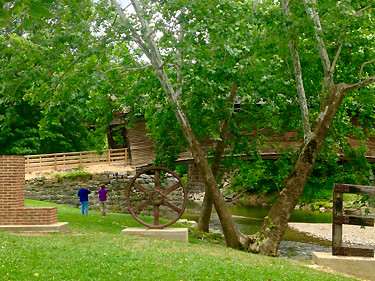
Find LOVE at Alleghany County Virginia's 160 year-old Humpback Bridge.[1.]
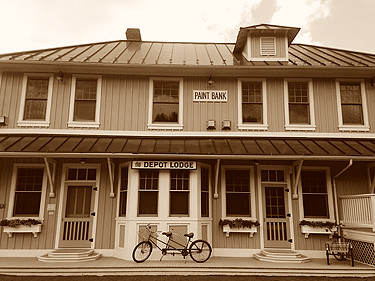
Paint Bank, in Craig County, Virginia got its unusual name from the iron ochre and red clay taken from the banks of Potts Creek that was used by Native Americans, notably the Cherokees, as war paint, and to make their pottery with a distinctive red color. Photo by Bob Kirchman

The General Store in Paint Bank, Virginia. The Swinging Bridge Restaurant is located in an extension of this building and features delicious buffalo dishes. Photo by Bob Kirchman
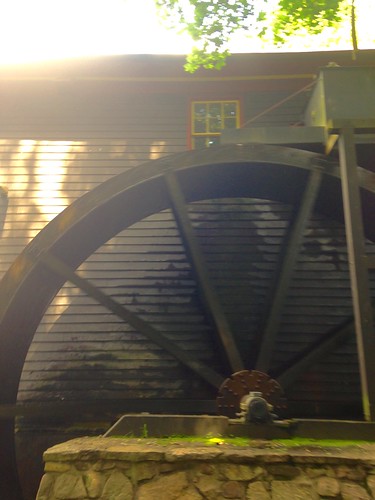
Tingler's Mill in Paint Branch, Virginia. Photo by Bob Kirchman
Why Beauty Matters
Finally, brethren, whatsoever things are true, whatsoever things are honest, whatsoever things are just, whatsoever things are pure, whatsoever things are lovely, whatsoever things are of good report; if there be any virtue, and if there be any praise, think on these things." -- Phillipians 4:8
Let thy work appear unto thy servants, and thy glory unto their children. And let the beauty of the Lord our God be upon us: and establish thou the work of our hands upon us; yea, the work of our hands establish thou it." -- Psalm 90:16,17
Around the World in 80 Days
by Jules Verne
[click to read]
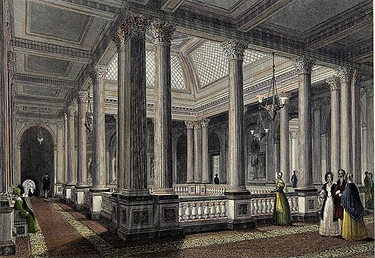
1841 Lithograph of the interior of London's Reform Club. Here Phileas Fogg enters into the wager that begins his attempt to circumnavigate the globe. The Reform Club is a private members club on the south side of Pall Mall in central London. As with all London's original gentlemen’s clubs, it comprised an all-male membership for decades, but was the first to change its rules to include the admission of women on equal terms in 1981. Since its founding, the Reform Club has been the traditional home for those committed to progressive political ideas, with its membership initially consisting of Radicals and Whigs. However, today it is no longer associated with any particular political party, and now serves a purely social function.
In 1832, Parliament passed a law changing the British electoral system. It was known as the Great Reform Act.
This was a response to many years of people criticising the electoral system as unfair. For example, there were constituencies with only a handful of voters that elected two MPs to Parliament. In these rotten boroughs, with few voters and no secret ballot, it was easy for candidates to buy votes. Yet towns like Manchester that had grown during the previous 80 years had no MPs to represent them.
In 1831, the House of Commons passed a Reform Bill, but the House of Lords, dominated by Tories, defeated it. There followed riots and serious disturbances in London, Birmingham, Derby, Nottingham, Leicester, Yeovil, Sherborne, Exeter and Bristol.
The riots in Bristol were some of the worst seen in England in the 19th century. They began when Sir Charles Weatherall, who was opposed to the Reform Bill, came to open the Assize Court. Public buildings and houses were set on fire, there was more than £300,000 of damage and twelve people died. Of 102 people arrested and tried, 31 were sentenced to death. Lieutenant-Colonel Brereton, the commander of the army in Bristol, was court-martialed.
There was a fear in government that unless there was some reform there might be a revolution instead. They looked to the July 1830 revolution in France, which overthrew King Charles X and replaced him with the more moderate King Louis-Philippe who agreed to a constitutional monarchy.
In Britain, King William IV lost popularity for standing in the way of reform. Eventually he agreed to create new Whig peers, and when the House of Lords heard this, they agreed to pass the Reform Act. Rotten boroughs were removed and the new towns given the right to elect MPs, although constituencies were still of uneven size. However, only men who owned property worth at least £10 could vote, which cut out most of the working classes, and only men who could afford to pay to stand for election could be MPs. This reform did not go far enough to silence all protest. -- UK National Archives
Around the World in 80 Days (French: Le tour du monde en quatre-vingts jours) is a classic adventure novel by the French writer Jules Verne, first published in 1873. In the story, Phileas Fogg of London and his newly employed French valet Passepartout attempt to circumnavigate the world in 80 days on a £20,000 wager set by his friends at the Reform Club. (read more)
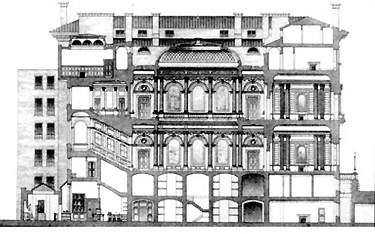
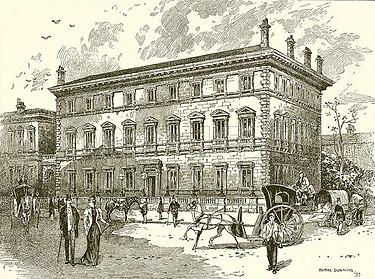
The Reform Club was founded in 1836, in Pall Mall, in the centre of what is often called London's Clubland. The founders commissioned a leading architect of the day, Charles Barry, to build an imposing and palatial clubhouse. It is as splendid today as when it opened in 1841. Membership was restricted to those who pledged support for the Great Reform Act of 1832, and the many MPs and Whig peers among the early members developed the Club as the political headquarters of the Liberal Party.
The Vision of Jules Verne
He was born in 1928 in the port city of Nantes, France. His father was a pragmatic lawyer but his mother nurtured his creative inclinations. Though he followed his father’s wishes and trained to be a lawyer, he would go on to meet publisher Pierre-Jules Hetzel who would serialize his stories. These Voyages Extraordinaires would eventually become his famous novels earning him the title: “Father of Science Fiction.” Although Verne died in 1905 his works continued to be published and he would become the second most translated author in the world. Verne saw the technological revolution of the Nineteenth Century as it unfolded and crafted new applications of it as he charted his ‘Voyages.’ It is not surprising that as a youth I was drawn to his work.
